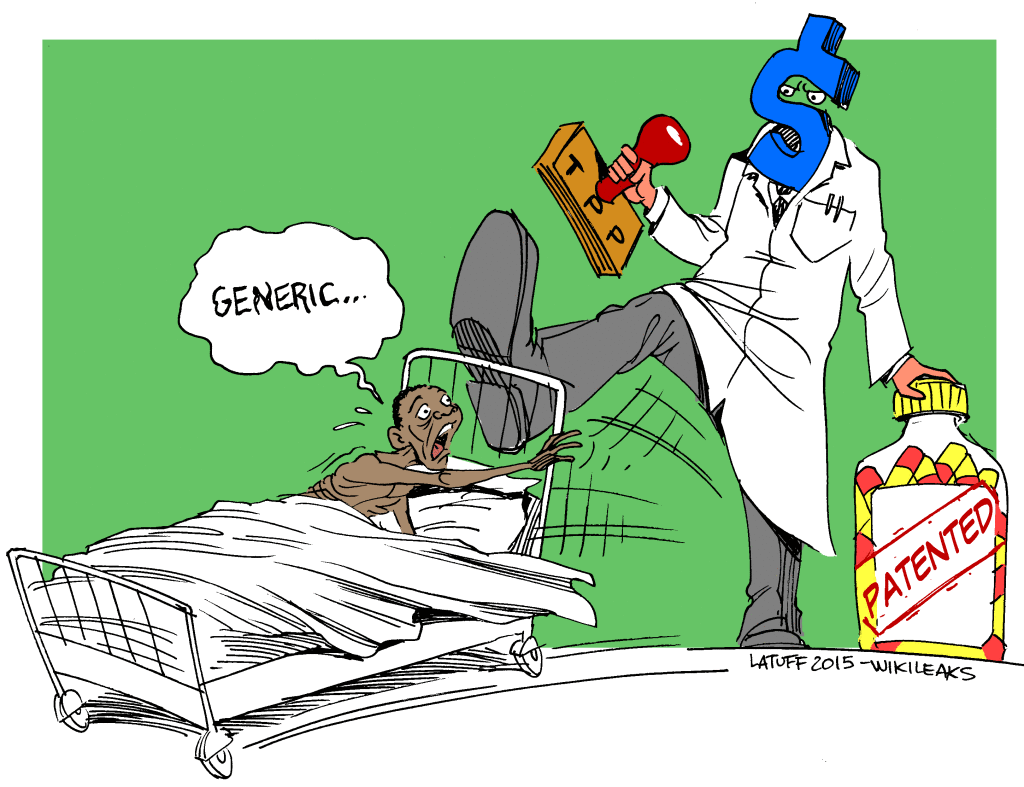TPP Treaty: Intellectual Property Rights Chapter
TRADE, 12 Oct 2015
WikiLeaks – TRANSCEND Media Service
Today, 9 October, 2015 WikiLeaks releases the final negotiated text for the TPP (Trans-Pacific Partnership) Intellectual Property Rights Chapter. The TPP encompasses 12 nations representing more than 40 per cent of global GDP. Despite a final agreement, the text is still being withheld from the public, notably until after the Canadian election on October 19.
The document is dated four days ago, October 5th, or last Monday, the same day it was announced in Atlanta, Georgia that the 12 member states to the treaty had reached an accord after five and a half years of negotiations.
The IP Chapter of the TPP has perhaps been the most controversial chapter due to its wide-ranging effects on internet services, medicines, publishers, civil liberties and biological patents. “If TPP is ratified, people in the Pacific-Rim countries would have to live by the rules in this leaked text,” said Peter Maybarduk, Public Citizen’s Global Access to Medicines Program Director. “The new monopoly rights for big pharmaceutical firms would compromise access to medicines in TPP countries. The TPP would cost lives.”
Hundreds of representatives from large corporations had direct access to the negotiations whereas elected officials had limited or no access. Political opposition to the TPP in the United States, the dominant member of the 12 negotiating nations, has increased over time as details have emerged through previous WikiLeaks disclosures. Notably, the Democratic front runner, Hillary Clinton, came out against the TPP on Wednesday saying: “Based on what I know so far, I can´t support this agreement.” This is a populist reversal by Hillary Clinton as earlier she has hailed the TPP as “the gold standard in trade agreements”.
In June the House of Representatives of the US Congress narrowly approved to “fast-track” the TPP, preventing the Congressmen from discussing or amending any parts of the treaty, only vote for or against it. 218 voted for the “fast-track” measure and 208 against. Only 28 House Democrats backed it. TPP is the first of a trinity of US backed economic treaties, the “Three Big T’s”, to be finalized. The other two being Trade in Services Agreement (TISA) which covers 52 countries and TTIP, the EU-US version of TPP.
View the leaked “TPP Treaty: Intellectual Property Rights Chapter, Consolidated Text” (PDF, HTML).
Experts Analysis
Expert Analysis: “Ambiguity Leads to Fallacy: Biologics Exclusivity in the Trans-Pacific Partnership” (PDF, HTML).
Expert Analysis: “Pharmaceutical Provisions in the TPP” (PDF, HTML).
Expert Analysis: “TPP Transition Periods on Pharmaceutical Intellectual Property Rules” (PDF, HTML).
Expert Analysis: “International Convention for the Protection of New Varieties of Plants 1991 (UPOV91)” (PDF, HTML).
Expert Analysis: “Propiedad intelectual en el Tratado Transpacífico” (PDF, HTML)
Expert Analysis: “Public Citizen – WikiLeaks Publication of Complete, Final TPP Intellectual Property” (PDF, HTML)
Go to Original – wilileaks.org
DISCLAIMER: The statements, views and opinions expressed in pieces republished here are solely those of the authors and do not necessarily represent those of TMS. In accordance with title 17 U.S.C. section 107, this material is distributed without profit to those who have expressed a prior interest in receiving the included information for research and educational purposes. TMS has no affiliation whatsoever with the originator of this article nor is TMS endorsed or sponsored by the originator. “GO TO ORIGINAL” links are provided as a convenience to our readers and allow for verification of authenticity. However, as originating pages are often updated by their originating host sites, the versions posted may not match the versions our readers view when clicking the “GO TO ORIGINAL” links. This site contains copyrighted material the use of which has not always been specifically authorized by the copyright owner. We are making such material available in our efforts to advance understanding of environmental, political, human rights, economic, democracy, scientific, and social justice issues, etc. We believe this constitutes a ‘fair use’ of any such copyrighted material as provided for in section 107 of the US Copyright Law. In accordance with Title 17 U.S.C. Section 107, the material on this site is distributed without profit to those who have expressed a prior interest in receiving the included information for research and educational purposes. For more information go to: http://www.law.cornell.edu/uscode/17/107.shtml. If you wish to use copyrighted material from this site for purposes of your own that go beyond ‘fair use’, you must obtain permission from the copyright owner.

